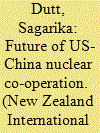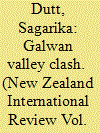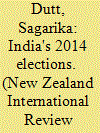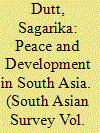| Srl | Item |
| 1 |
ID:
087750


|
|
|
|
|
| Publication |
2009.
|
| Summary/Abstract |
The rapid growth of the Indian economy has prompted the Indian government to address the issue of energy security. In october 2008 India and the US signed the 123Aggrement for Co-operation in the field of civilian nuclear energy.
|
|
|
|
|
|
|
|
|
|
|
|
|
|
|
|
| 2 |
ID:
180413


|
|
|
|
|
| Summary/Abstract |
On 15 June 2020 Indian and Chinese troops clashed in the Galwan valley along the line of actual control (LAC) in eastern Ladakh. It claimed the lives of twenty Indian army personnel, according to Indian government sources. A number of Chinese soldiers were also killed in this conflict. It was the culmination of a border stand-off that began in May. This is not the first time that there have been serious tensions in the border areas. The last time there was a military standoff between the two armies was in 2017 in Doklam. But this time it was even more serious and the Indian prime minister, Narendra Modi, has taken it to heart. He feels that it was a betrayal by the Chinese government after he had extended a hand of friendship and goodwill to them and signed business deals with them. It reminds one of how Jawaharlal Nehru felt when the 1962 war between India and China took place. In a televised message to the Indian nation, Modi said that the martyrdom of the twenty soldiers will not be in vain and that India's territorial integrity and sovereignty is supreme. India will do whatever it takes to defend the country and its borders. This article reflects on and analyses India's response to the border clash and the efforts that have been made by India and China to de-escalate tensions in the border areas.
|
|
|
|
|
|
|
|
|
|
|
|
|
|
|
|
| 3 |
ID:
134022


|
|
|
|
|
| Publication |
2014.
|
| Summary/Abstract |
The Indian general elections of 2014 to the 16th Lok Sabha (lower house of Parliament) were held between 7 April and 12 May. More than 500 million people cast their vote in these elections, and it is estimated that the turnout was the highest ever in the country's history. After a vigorous election campaign, the BJP, led by its idiosyncratic leader Narendra Modi, performed better than expected, winning the elections in a landslide and forming the new government. The international response to the BJP's triumph has been positive. The need to attract foreign direct investment was a key feature of the 2014-15 union budget presented by the new government in July.
|
|
|
|
|
|
|
|
|
|
|
|
|
|
|
|
| 4 |
ID:
184596


|
|
|
|
|
| Summary/Abstract |
The 26th United Nations Climate Change Conference or COP26 was held in Glasgow, Scotland, between 31 October and 12 November 2021. Convened under the presidency of the United Kingdom, the conference had as its main aim the acceleration of action towards achieving the goals of the 2015 Paris Agreement and the UN Framework Convention on Climate Change. Following two weeks of intense negotiations, the Glasgow Climate Pact was adopted. Reflecting a delicate balance, it stresses the urgency of enhancing ambition and action in relation to mitigation, adaptation and finance to address the gaps in the achievement of these goals.
|
|
|
|
|
|
|
|
|
|
|
|
|
|
|
|
| 5 |
ID:
193240


|
|
|
|
|
| Summary/Abstract |
South Asia has been recognised by the World Bank as an important region in the Global South. It has achieved robust economic growth over the past 20 years which has helped in reducing poverty and improving standards of human development. On the other hand, 36% of the world’s poor live in South Asia, so a lot more needs to be done. This article argues that South Asian countries need peace and stability in order to be able to concentrate on their economic development and achieve the UN’s Sustainable Development Goals. Centuries of colonial rule had led to the impoverishment of the South Asian region and its people. It also created two states, India and Pakistan, that have never had good relations with each other. This has had an impact on regional cooperation and prevented the countries in the region from working together to achieve their developmental goals. The article concludes that while the region needs to sustain high economic growth rates, it does not automatically lead to the reduction of poverty. Other measures have to be adopted to promote the welfare of the people of South Asia.
|
|
|
|
|
|
|
|
|
|
|
|
|
|
|
|
| 6 |
ID:
114069


|
|
|
|
|
| Publication |
2012.
|
| Summary/Abstract |
This article discusses the role of the UN in global governance. In the absence of a world government to determine codes of conduct and regulate relations between states, multilateral approaches are needed to solve global problems. The UN provides an institutional framework for policy formulation and decision making at the international level. However, policies need to be underpinned by ideas and norms and the intellectual history of the UN suggests that the organisation is the source of many ideas that have led to human progress. For example, the concept of human rights and ideas about social and economic development and environmental sustainability have guided the UN's work in different countries. But there are gaps in global governance including normative, policy, institutional and compliance gaps that together with a deficiency of resources could undermine the global effort to implement the UN's ideas for creating a more peaceful and just world.
|
|
|
|
|
|
|
|
|
|
|
|
|
|
|
|